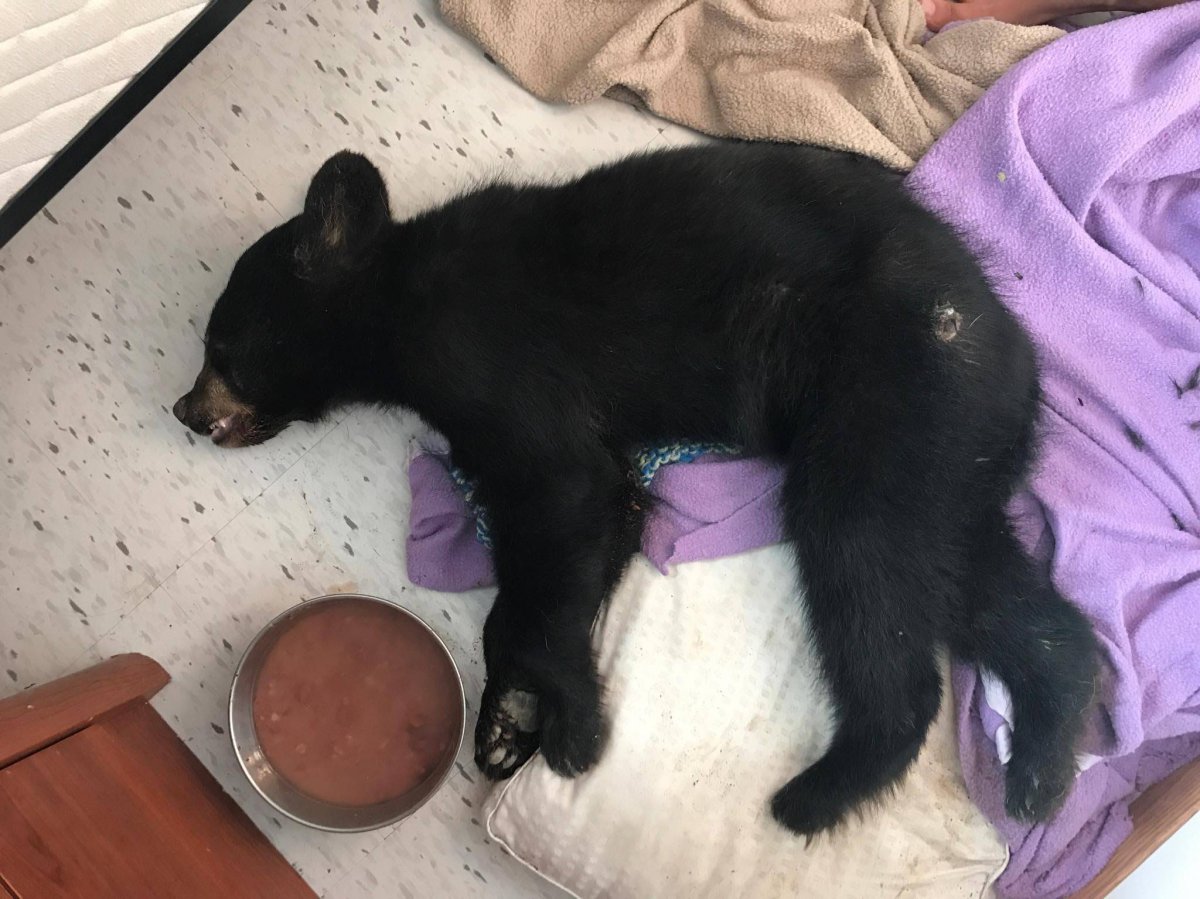An injured black bear cub found in a garbage dump is now in care at the Assiniboine Park Zoo thanks to the efforts of a nurse in Bloodvein First Nation.

On July 12, Jasmine Colucci, a community nurse at the nursing station received an unusual patient after two kids found an injured black bear at the community’s garbage dump.
The bear was brought to the nursing station and Colucci, along with another nurse who had been a vet tech in the past, diagnosed the bear as being malnourished and dehydrated.
“It was skin and bones and its gums were white which is a sign of dehydration,” Colucci said.
They tried starting an IV but its veins were so tiny they weren’t able to get one. They eventually managed to make one work in the bear’s neck.
RELATED: Manitoba’s Bear Rehabilitation Centre could open this summer
“We managed to get in because the bear was basically not moving at all, it couldn’t even stand,” Colucci said.
They said they tried calling Manitoba Conservation but couldn’t get a hold of them.
“We knew we needed to do something with the bear overnight. And I’m the only one that lives in the community out of all the nurses here, all the rest live in the nursing station. So we all agreed it could come to my house for the night.”
The bear stayed on the floor in a homemade bed in Colucci’s bedroom. After five hours with the IV, the bear had received a litre of fluids. She then started the bear on antibiotics and pain medications
RELATED: Black bear sightings lead to warning from Manitoba Conservation
Colucci runs a dog rescue organization, K9 Advocates Manitoba, so she estimated how much of the meds to give the bear by comparing them to a dog of similar size.
“It was so lethargic, I didn’t think it was going to get up at all.” Colucci said. “It had big deep puncture wounds all over its body with maggots inside so I did some wound care on it.”
After being re-hydrated the bear gained a little more energy and started exploring her new surroundings.
“I had my door shut and I was in my living room and I could hear this banging noise,” she said. “So I went in my bedroom and she turned her head and looked at me and she was halfway out the window. She ripped through the screen.”
When the bear saw Colucci, it jumped down from the bed on its own and laid back on its homemade bed.
Colucci fed the bear wet dog food and kept it hydrated. When cub was done with the food it would push Colucci’s hand away with its paw, and when it wanted more she’d pull Colucci’s hand back.
“She was still in a lot of pain, you could tell. She couldn’t really move her neck much and she wasn’t steady on her feet at all because of the amount of wounds and infection she had.”
Once the bear started to gain a little more awareness, she started to get more cautious around Colucci, clenching her teeth and blowing through her nose.
“Her teeth were definitely bigger than an average sized dog,” she said.
RELATED: ‘Price is Right’ former star, Bob Barker, funds Manitoba black bear sanctuary
Colucci was caring for 12 rescue dogs who were very cautious around their new roommate.
“They were so scared of it and unsure of what to do,” she said. “Some were coming into the bedroom and the bear would give me them this look and they would back up slowly.”
After caring for the cub all night and most of the next day, Colucci said Manitoba Conservation picked it up around 4 p.m. and transported it to the Assiniboine Park Zoo.
“Sometimes they don’t always end in happy endings but I’m so glad this one did.”
A provincial spokesperson said the bear was showing “modest signs of improvement” but, because of the number of serious injuries, they couldn’t speculate on the “long term prognosis”.
- Posters promoting ‘Steal From Loblaws Day’ are circulating. How did we get here?
- Canadian food banks are on the brink: ‘This is not a sustainable situation’
- Video shows Ontario police sharing Trudeau’s location with protester, investigation launched
- Solar eclipse eye damage: More than 160 cases reported in Ontario, Quebec





Comments